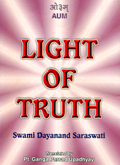About Vedas
- The four Vedas have been given in the beginning of the world to the earliest group of four men (Agni, Vayu, Aditya and Angira) in Sanskrit language, prior to which there was no other language.
- The words of the Vedas, particularly the nouns (nama) are derived from akhyatas (from roots or verbs), and they are in the most elastic and flexible forms (they are yaugika and yoga-rudhi and not rudhi).
- The Vedas have nothing in them which is contradictory to what is not observed in God's creation. They are most scientific.
- The Vedas assign to the entire mankind the supreme code of conduct of human life (life both individual and social).
- The Vedas do not represent any human history or the events of political geography. We all are children of the Mother-Earth. There is no human history or geography in the texts of the Vedas.
- The Vedas regard creation as real, dynamic and purposeful.
- The Vedas support pure monotheism (not monism), neither polytheism nor the concept of godheads, prophets and incarnations in human or demi-human forms.
- The Vedas do not support miracles, credulities or superstitions.
Read more Vedic Literature
THE LIGHT OF TRUTH
 “I have not come to preach any new dogmas or religion, nor to establish a new order, nor be proclaimed a new Messiah or Pontiff. I have only brought before my people the light of the Vedic wisdom which had been hidden during the centuries of India’s thralldom.”
“I have not come to preach any new dogmas or religion, nor to establish a new order, nor be proclaimed a new Messiah or Pontiff. I have only brought before my people the light of the Vedic wisdom which had been hidden during the centuries of India’s thralldom.”
The Satyartha Prakhash (The light of Truth) is the masterpiece of Swami Dayanand Saraswati. Some call it as Magnum Opus. No doubt, it is a great literary undertaking, as the lexicographic contents denote. But I go a step further. The lexicon (Oxford) says, Magnum, a bottle containing a certain quantity of wine. But as the great writer of this masterpiece Swami Dayanand was a symbol of ultimate morality and spiritualism...
Read More...
Read Stayarth Prakash in 18 different Languages
Quick Links

Sponsor a Child
Gift Back Their Childhood
The historical earthquake of 2001 has left a permanent destructive mark on Kutch-Gujarat.
Child Charity
Child Charities
You are always Welcome to Jeevan Prabhat The main aim of Arya Samaj is the upliftment of children and women.







